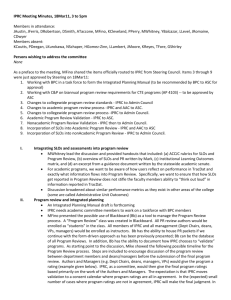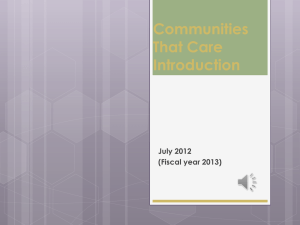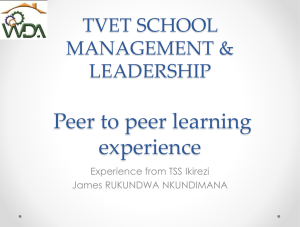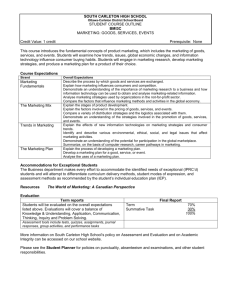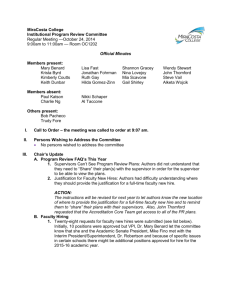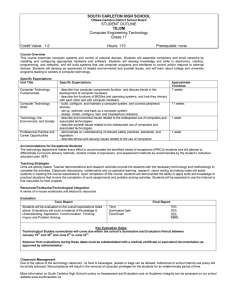UPPER GRAND DISTRICT SCHOOL BOARD Parent Guide to
advertisement
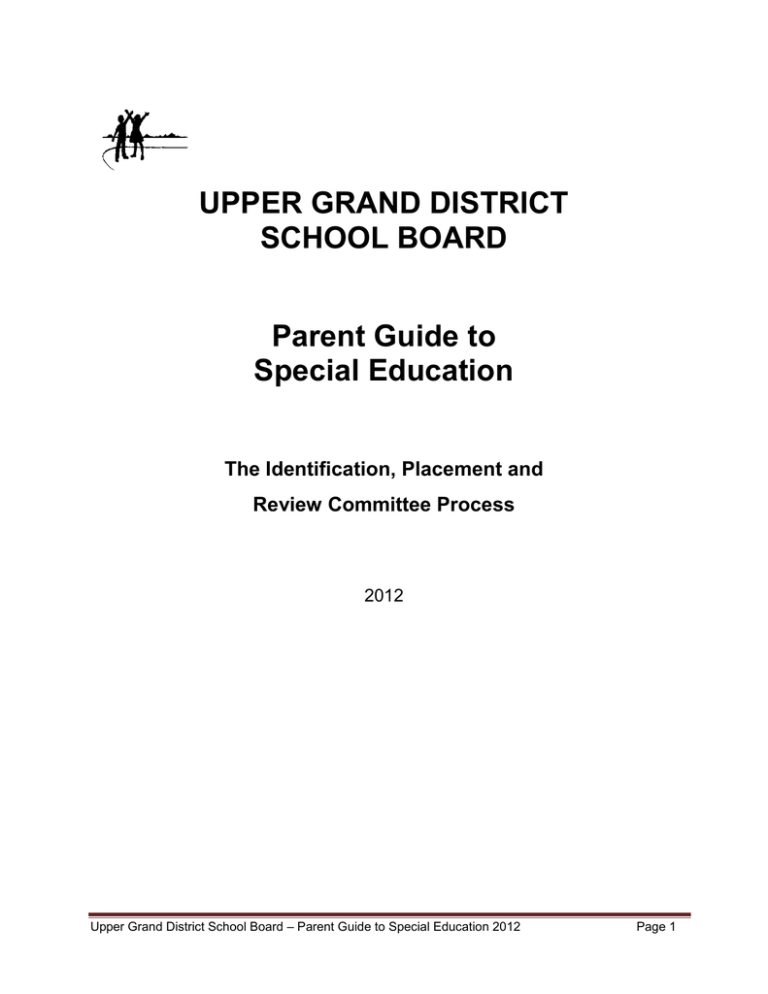
UPPER GRAND DISTRICT SCHOOL BOARD Parent Guide to Special Education The Identification, Placement and Review Committee Process 2012 Upper Grand District School Board – Parent Guide to Special Education 2012 Page 1 Upper Grand District School Board Beliefs about Special Education • We believe all students can learn. • We value each student’s unique ability, individuality, learning style and pace of learning. • We believe that the growth, the development and the learning of each student is enhanced in the most enabling environment. • We believe that the inclusion of exceptional students in the school community provides a valuable learning experience for all children. • We deliver programs which incorporate realistic goals and objectives through individualized teaching and assessment methods. • We respect the rights of parents to make informed decisions in the best interests of their children. • We respect, value and encourage collaborative partnerships with parents, community agencies and professionals. • We provide a variety of placements and resources which reflect effective programs and strategies for exceptional pupils. • We recognize the wealth of learning opportunities in the community which assist students with transitions, to offer work experiences and to allow their pursuit of special abilities or talents. • We value early intervention for all students experiencing difficulties in school and/or needing enrichment. Upper Grand District School Board – Parent Guide to Special Education 2012 Page 2 Introduction This guide was written for parents to answer questions about Special Education Services before an Identification, Placement and Review Committee (IPRC) meeting is held for their child. If you need more information after reading this guide, please see the board contact information on page 13 of this booklet. Many parent organizations are available to provide information and support to parents of exceptional children. Please see the list of parent organizations represented on the Special Education Advisory Committee (SEAC) on page 13. Notes: 1. For a Braille, large print or electronic copy of this guide, contact: The Special Education Department of the Upper Grand District School Board located at 40 Amelia Street, Orangeville, Ontario, L9W 3T8. Telephone: 519-941-6191 2. In this guide, the word “parents” is meant to include “guardian”. More information about Special Education Services can be found on the Upper Grand District School Board website in the Special Education Report www.ugdsb.on.ca/uploadedFiles/program/special_education/SpecialEducationReport2012.pdf Upper Grand District School Board – Parent Guide to Special Education 2012 Page 3 The Upper Grand District School Board Special Education Model When parents have a concern about their child’s success in school, the following are the steps that lead to special education services. Parents and educators are encouraged to work as collaborative partners throughout the steps. Step 1: Talk with the teacher When parents have a special education concern about their child, the first step is to talk with the child’s teacher. Then the parent and teacher develop a plan to deal with the concerns. Step 2: In-School Team The student’s classroom teacher can work with the school Special Education Resource Teacher (SERT) to discuss the student’s plan and progress. This happens at regularly scheduled In-School Team (IST) meetings. Step 3: Consultant Support Team At any time, the teacher, parent and/or principal may decide to seek the advice of program consultants. This is typically available to all schools through a professional meeting called a Consultant Support Team (CST). Parents are consulted along the way and the school will ask for parental permission to speak about their child at the CST and before arranging any recommended follow-up. The Consultant Support Team (CST) meets several times through the school year. It includes school staff as well as: • Special Education Consultant • Speech - Language Pathologist • School Psychologist • Counselling and Attendance Services staff The team will discuss what has been done so far to help the student and make additional suggestions or recommendations. Discussion topics may include: • assessments to find out more about the student’s learning needs • supports that are available in the community Case Conference A case conference is a meeting that is held that focuses on one student for a more indepth discussion. Case conferences are held as needed throughout elementary and secondary school. Case conferences are held to share information, to develop plans or to respond to concerns. Parents, school staff, board staff and community service providers may attend case conferences. Examples of case conferences are: a case conference for a student with complex needs who is beginning junior kindergarten; and a case conference to develop a plan to support a secondary school with a recent diagnosis of a mental health disorder. These Upper Grand District School Board – Parent Guide to Special Education 2012 Page 4 meetings may be held to share assessment findings from board assessments or assessments from community resources. The Individual Education Plan (IEP) An Individual Education Plan is often developed for students when special supports are needed. It is not necessary to have an Identification Placement Review Committee (IPRC) meeting before starting an IEP for a student. What is an IEP? • An IEP is a written plan that describes the special education program and/or services needed by a student. • It is based on assessments that show the student’s learning strengths and needs. • It describes the key features of the program and/or services. • It is not a daily plan or outline of everything that will be taught to the student. How does an IEP help a student? The special education program may have: • accommodations • modifications • alternative expectations What is the difference between accommodations and modifications? Accommodations are strategies that will help a student meet the curriculum expectations of his/her grade-level. Some examples of accommodations are: • extra time to complete assignments • use of amplification equipment for hearing loss • preferential seating • having instructions repeated Modifications are changes to the curriculum so that a student will be given work at their ability level in a particular subject or course. The student works at a different grade level in the subjects that are chosen. What are Alternative Expectations? Alternative Expectations are activities and goals that are not part of the regular Ontario curriculum, but are added when needed by a student. Some examples are: • personal care (dressing, feeding, toileting) • managing behaviour • basic communication skills including augmentative/alternative communication What must be included in the IEP? An IEP must include: • a student’s strengths and needs as discovered through assessment Upper Grand District School Board – Parent Guide to Special Education 2012 Page 5 • • • an outline of the special education program and services that will be provided specific educational expectations, teaching strategies and assessment methods for modified and alternative curriculum transition plans for students 14 years and older (except those identified as gifted) to appropriate post-secondary school activities such as work, further education, and community living The Identification Placement and Review Committee (IPRC) What is the role of the IPRC? The IPRC will: • decide whether or not your child should be identified as exceptional • identify the areas of your child’s exceptionality, according to the categories and definitions of exceptionalities provided by the Ministry of Education • decide an appropriate Upper Grand District School Board placement for your child • review the identification and placement at least once in each school year What is an Identification Placement and Review Committee? This is a committee that all Ontario school boards must set up as required by the Ontario Education Act. An IPRC is composed of at least three persons and must include a principal or viceprincipal. The Upper Grand District School Board has both System level and School level Identification Placement and Review Committees. A System Level IPRC usually includes: • Principal of the student’s school, or designate • one other member (Principal/Vice-Principal, Special Education Teacher) • Special Education Consultant (Chair) • Parents This committee conducts the first IPRC meeting for a student and additional meetings for special circumstances. A School Level IPRC usually includes: • Principal (Chair) or designate • Special Education Teacher • Regular Education Teacher • Parents This committee meets once a year to review the education and placement plan for a student after the initial IPRC has taken place. Upper Grand District School Board – Parent Guide to Special Education 2012 Page 6 What are the different types of placements? Students for whom more than 50% of the instructional day is delivered in a regular class: • Regular class with Indirect Support o Students who are enrolled in a regular class and are receiving direct specialized instruction from a regular classroom teacher to whom the board provides specialized consultative services. • Regular class with Resource Assistance o Students who are in a regular class and are receiving direct specialized instruction, individually or in a small group with the regular classroom from a special education teacher. • Regular class with Withdrawal Assistance o Students who are enrolled in a regular class and are receiving instruction outside the regular classroom for part of the school day from a special education teacher. Students for whom more than 50% of the instructional day is delivered in a special class: • Special Education class with Partial Integration o Students who are enrolled in and attending a self-contained special education class and integrated for at least one instructional period daily. • Special Education class Full Time o Students who are enrolled and attending a self-contained special education class for the entire school day. What special education programs and services are provided by the board? Students who need special education programs and services usually receive support through the Classroom Teacher and the school’s Special Education Resource Teacher. However, there are other special education placements if additional support is needed. Specialized class programs in Upper Grand District School Board include: Developmental Disability, Learning Disability, Mild Intellectual Disability and Gifted. What are the ministry’s provincial and demonstration schools? The Ministry operates provincial and demonstration schools throughout Ontario for deaf, blind, deaf-blind, and severely learning-disabled students, as well as severely learning disabled students with attention deficit hyperactivity disorder (ADHD). Residential programs are offered at the schools Monday to Friday, for students who live too far from school to travel daily. For a list of provincial and demonstration schools, please see page 12 or visit http://www.psbnet.ca/eng/index.html. Who is identified as an exceptional pupil? The Education Act defines an exceptional pupil as “a pupil whose behavioural, communication, intellectual, physical or multiple exceptionalities are such that he or she is considered to need placement in a special education program…” Upper Grand District School Board – Parent Guide to Special Education 2012 Page 7 Students are identified according to how their needs match the categories and definitions of exceptionalities provided by the Ministry of Education which are: • Behavioural • Communication o Autism o Deaf and Hard of Hearing o Language Impairment o Speech Impairment o Learning Disability • Intellectual o Giftedness o Mild Intellectual Disability o Developmental Disability • Physical o Physical Disability o Blind and Low Vision • Multiple o Multiple Exceptionalities For more information about the categories and definitions of exceptionalities please see page 14. How is an IPRC meeting requested? The principal of your child’s school requests an IPRC meeting when: • the principal and your child’s teacher(s) believe that a special education program will be helpful. Parents must be notified in writing before the IPRC is requested • a parent makes a written request for an IPRC to the principal Within 15 days of receiving your request, or giving you notice, the principal must provide you with a copy of this guide and a written statement of approximately when the IPRC will meet. May parents attend the IPRC meeting? Yes, parents are encouraged to attend the meeting. Questions and input from parents are welcomed. What if parents are unable to make the scheduled meeting? Parents may: • contact the school principal to arrange an alternative date or time if possible • let the school principal know you will not be attending • if you do not attend, the principal will send you the IPRC’s written statement of identification and placement decision and any recommendations regarding special education programs and services. You will be asked to consider the decision and sign the form if you agree Upper Grand District School Board – Parent Guide to Special Education 2012 Page 8 Who else may attend an IPRC meeting? Either you or the principal of your child’s school may ask for others to attend the meeting. This may include: • other school resource people such as your child’s teacher, special education staff, board support staff • the representative of an agency who may provide further information or clarification • a person who may support you or speak on behalf of you or your child • an interpreter; if one is required (You can request the services of an interpreter through the principal of your child’s school) What information will parents receive about the IPRC meeting? • At least 10 days before the meeting, you will receive written notification of the date, time and place of the meeting. • You will be invited to attend as an important partner in considering your child’s placement. • You will need to indicate whether you will attend. What happens at an IPRC meeting? • The chair introduces everyone and explains the purpose of the meeting. • The committee will review: o all available information about your child provided by the school o information that you may have submitted about your child ahead of time o information provided by your child if he or she is 16 years of age or older • The committee may discuss any proposal that has been made about a special education program or special education services for the child. • Committee members will discuss any such proposal at your request, or at the request of your child if the child is 16 years of age or older. • You are encouraged to ask questions and join in the discussion. • Following the discussion, after all the information has been presented and considered, the committee will make its decision. What will the IPRC consider in making its placement decision? • The IPRC committee will consider if your child’s needs could be met in a regular class with appropriate special education services. • If not, a special education class (50% or more of the day) may be considered. If so, the committee must state the reasons for that decision in its written statement. • Parent preferences for the child’s placement are considered before a decision is made. Upper Grand District School Board – Parent Guide to Special Education 2012 Page 9 What will the IPRC’s written statement of decision include? The IPRC’s written statement of decision will state: • whether the IPRC has identified your child as exceptional; o the categories and definitions of any exceptionalities identified, as they are defined by the Ministry of Education; o the IPRC’s description of your child’s strengths and needs; o the IPRC’s placement decision; o the IPRC’s recommendations regarding a special education program and special education services; • if the IPRC has decided that your child should be placed in a special education class, the reasons for that decision What happens after the IPRC has made its decision? If you agree with the recommendations about your child’s identification and placement, you will be asked to sign the IPRC form. The school will forward you this form following the IPRC meeting. The school will be notified that you agree with the decision and then an IEP will be developed within 30 school days of placement. Once a child has been placed in a special education program, can the placement be reviewed? • Identified students have their exceptionality and placement reviewed by a school level IPRC once a year. You may request a review IPRC meeting any time after your child has been in a special education program for 3 months. • The IPRC will review the placement and identification decisions and decide whether they should be continued or whether a different decision should now be made. What can parents do if they disagree with the IPRC decision? If you do not agree with the IPRC’s identification or placement decision you may: • within 15 days of receipt of the decision, request that the IPRC hold a second meeting to discuss your concerns; or • within 30 days of receipt of the decision, file a notice of appeal with the Director of Education and Secretary-Treasurer, Upper Grand District School Board, 500 Victoria Road North, Guelph, ON N1E 6K2 If you do not agree with the decision after the second meeting, you may file a notice of appeal within 15 days of your receipt of the decision. If you do not consent to the IPRC decision and you do not appeal it, the board will instruct the principal to implement the IPRC decision. Upper Grand District School Board – Parent Guide to Special Education 2012 Page 10 The IPRC Appeal Process How do I appeal an IPRC decision? If you disagree with the IPRC’s identification of your child as exceptional or with the placement decision of the IPRC, you may, within 30 days of receipt of the original decision or with 15 days of receipt of the decision from the second meeting described above, give written notification of your intention to appeal the decision to the Director of Education and Secretary-Treasurer. The notice of appeal must: • indicate the decision with which you disagree; and • include a statement that sets out your reasons for disagreeing. What happens in the appeal process? The appeal process involves the following steps: • The board will establish a special education appeal board to hear your appeal. The appeal board will be composed of three persons (one of whom is to be selected by you, the parent) who have no prior knowledge of the matter under appeal. • The chair of the appeal board will arrange a meeting to take place at a convenient time and place, but no later than 30 days after he or she has been selected (unless parents and board both provide written consent to a later date). • The appeal board will receive the material reviewed by the IPRC and may interview any persons who may be able to contribute information about the matter under appeal. • You, the parent, and your child, if he or she is 16 years old or over, are entitled to be present at, and to participate in, all discussions. • The appeal board must make its recommendation within three days of the meeting. It may: o agree with the IPRC and recommend that the decision be implemented; or o disagree with the IPRC and make a recommendation to the board about your child’s identification, placement, or both • The appeal board will report its recommendation in writing, to you and to the school board, providing the reasons for its recommendations. • Within 30 days of receiving the appeal board’s written statement, the school board will decide what action it will take with respect to the recommendations (boards are not required to follow the appeal board’s recommendation). • You may accept the decision of the school board, or you may appeal to a Special Education Tribunal. You may request a hearing by writing to the Secretary of the Special Education Tribunal. Information about making an application to the tribunal will be included with the appeal board’s decision. Upper Grand District School Board – Parent Guide to Special Education 2012 Page 11 Provincial and Demonstration Schools Demonstration schools for English-speaking students with severe learning disabilities and for students with learning disabilities in association with ADHD: Sagonaska Demonstration School 350 Dundas Street West Belleville, ON K8P 1B2 Phone: 613-967-2830 Trillium Demonstration School 347 Ontario Street South Milton, ON L9T 3X9 Phone: 905-878-2851 Amethyst Demonstration School 1515 Cheapside Street London, ON N5V 3N9 Phone: 519-453-4400 Schools for the Deaf: Ernest C. Drury School for the Deaf 255 Ontario Street South Milton, ON L9T 2M5 Phone: 905-878-2851 TTY: 905-878-7195 The Robarts School for the Deaf 1515 Cheapside Street London, ON N5V 3N9 Phone and TTY: 519-453-4400 Sir James Whitney School for the Deaf 350 Dundas Street West Belleville, ON K8P 1B2 Phone and TTY: 613-967-2823 School for the blind and deaf-blind: W. Ross Macdonald School for the Blind 350 Brant Avenue Brantford, ON N3T 3J9 Phone: 519-759-0730 Francophone school for the deaf and for those with learning disabilities: Centre Jules-Leger 281 rue Lanark Ottawa, ON K1Z 6R8 Phone: 613-761-9300 Upper Grand District School Board – Parent Guide to Special Education 2012 Page 12 Parent Organizations Many parent organizations are available to provide information and support to parents of exceptional children. Parent support groups currently represented on the Special Education Advisory Committee (SEAC) are listed below. To view the Special Education Advisory Committee brochure please visit http://www.ugdsb.on.ca/program/article.aspx?id=968 Association for Bright Children of Ontario (ABC) Autism Ontario Community Living Guelph Wellington Easter Seals Ontario FASD-Fetal Alcohol Spectrum Disorders Integration Action for Inclusion in Education and Community (Ontario) Learning Disabilities Association of Wellington County Parents for Children’s Mental Health VIEWS for Children Who Are Blind or Have Low Vision VOICE For Hearing Impaired Children Members-at-Large Associated with Community Care Access Where can parents obtain additional information? Additional information can be obtained from the Special Education Department of the Upper Grand District School Board located at 40 Amelia Street, Orangeville, Ontario, L9W 3T8. Telephone: 519-941-6191. Upper Grand District School Board – Parent Guide to Special Education 2012 Page 13 Categories and Definitions of Exceptionalities The following are the categories and definitions of exceptionalities provided by the Ministry. Behaviour A learning disorder characterized by specific behaviour problems over such a period of time, and to such a marked degree, and of such a nature, as to adversely affect educational performance, and that may be accompanied by one or more of the following: a) an inability to build or to maintain interpersonal relationships ; b) excessive fears or anxieties; c) a tendency to compulsive reaction; d) an inability to learn that cannot be traced to intellectual, sensory, or other health factors, or any combination thereof . Communication Autism A severe learning disorder that is characterized by: a) disturbances in: - rate of educational development; - ability to relate to the environment; - mobility; - perception, speech, and language; b) lack of the representational symbolic behaviour that precedes language . Deaf and Hard-of-Hearing An impairment characterized by deficits in language and speech development because of a diminished or non-existent auditory response to sound. Language Impairment A learning disorder characterized by an impairment in the comprehension and/or the use of verbal communication or the written or other symbol system of communication, which may be associated with neurological, psychological, physical, or sensory factors, and which may: a) involve one or more of the form, content, and function of language in communication; and b) include one or more of the following: - language delay; - dysfluency; - voice and articulation development, which may or may not be organically - or functionally based. Upper Grand District School Board – Parent Guide to Special Education 2012 Page 14 Speech Impairment A disorder in language formulation that may be associated with neurological, psychological, physical, or sensory factors; that involves perceptual motor aspects of transmitting oral messages; and that may be characterized by impairment in articulation, rhythm, and stress. Learning Disability A learning disorder evident in both academic and social situations that involves one or more of the processes necessary for the proper use of spoken language or the symbols of communication, and that is characterized by a condition that: a) is not primarily the result of: - impairment of vision; - impairment of hearing; - physical disability; - developmental disability; - primary emotional disturbance; - cultural difference; b) results in a significant discrepancy between academic achievement and assessed intellectual ability, with deficits in one or more of the following: - receptive language (listening, reading); - language processing (thinking, conceptualizing, integrating); - expressive language (talking, spelling, writing); - mathematical computations; and c) may be associated with one or more conditions diagnosed as: - a perceptual handicap; - a brain injury; - minimal brain dysfunction; - dyslexia; - developmental aphasia. Intellectual Giftedness An unusually advanced degree of general intellectual ability that requires differentiated learning experiences of a depth and breadth beyond those normally provided in the regular school program to satisfy the level of educational potential indicated. Mild Intellectual Disability A learning disorder characterized by: a) an ability to profit educationally within a regular class with the aid of considerable curriculum modification and supportive service; b) an inability to profit educationally within a regular class because of slow intellectual development; c) a potential for academic learning, independent social adjustment, and economic self-support. Upper Grand District School Board – Parent Guide to Special Education 2012 Page 15 Developmental Disability A severe learning disorder characterized by: a) an inability to profit from a special education program for students with mild intellectual disabilities because of slow intellectual development; b) an ability to profit from a special education program that is designed to accommodate slow intellectual development; c) a limited potential for academic learning, independent social adjustment, and economic self-support. Physical Physical Disability A condition of such severe physical limitation or deficiency as to require special assistance in learning situations to provide the opportunity for educational achievement equivalent to that of pupils without exceptionalities who are of the same age or developmental level. Blind and Low Vision A condition of partial or total impairment of sight or vision that even with correction affects educational performance adversely. Multiple Multiple Exceptionalities A combination of learning or other disorders, impairments, or physical disabilities, that is of such nature as to require, for educational achievement, the services of one or more teachers holding qualifications in special education and the provision of support services appropriate for such disorders, impairments, or disabilities. Upper Grand District School Board – Parent Guide to Special Education 2012 Page 16
